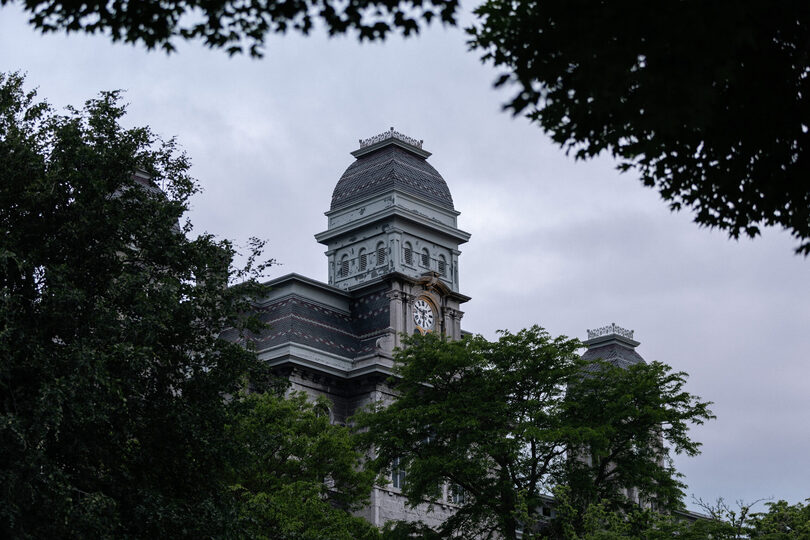Recording lectures, AI rules updated in Academic Affairs’ campus policy

The Office of Academic Affairs made updates to its university-wide academic policies this summer to address artificial intelligence usage. New policies include academic integrity updates and the prohibition of covert class lecture recordings. Joe Zhao | Senior Staff Photographer
Get the latest Syracuse news delivered right to your inbox.
Subscribe to our newsletter here.
In an effort to standardize artificial intelligence use and classroom recording on Syracuse University’s campus, the Office of Academic Affairs made updates to its university-wide academic policies this summer.
Interim Vice Chancellor Lois Agnew said the policies, which were outlined in a Thursday campus-wide email, came in response to concerns regarding academic integrity and privacy matters.
The policies “assure that classrooms are spaces where instructors and students can explore ideas and engage thoughtfully with diverse perspectives,” according to the email.
Here’s what students and faculty need to know about SU’s new Academic Integrity and Classroom Recording policies.
Updates to Academic Integrity
On July 8, Agnew approved SU’s updated Academic Integrity Policy, which features four categories of expectations.
“This policy is designed to cultivate an academic environment of honesty and integrity by ensuring that students adhere to certain ethical standards in their academic work,” the website states. “It addresses academic integrity standards that apply to students and governs the way in which faculty instructors, and administrators must handle suspected violations.”
Suspected violations will be reported promptly, meaning a student will be notified within two weeks after the incident took place or was discovered, according to the office. The violations will be categorized on a three-level system.
Level 1 results in a school or college letter of reprimand. Level 2 results in an academic integrity probation and Level 3 is a suspension or expulsion.
The dean of each SU college will appoint an Academic Integrity Coordinator, who will be in charge of implementing these policies in their classrooms.
Students must cite or clearly acknowledge usage of other people’s ideas, information, language and images in their work, according to the policy.
The policy also states that students must do their own work, unless an instructor gives instructions for collaboration or editing. Those who submit previous work from other classes or high school must obtain written approval from their SU instructors before submission.
AI technology usage varies depending on the course and professor in this policy.
Any report of suspected inappropriate generative-AI use will be counted as a policy violation. Websites such as Purdue OWL and thesaurus.com are not considered to be generative-AI tools, according to the office.
The policy encourages honest communication with professors and peers through accurate reporting of participation and honesty in deadline extension requests.
Students and instructors are encouraged in the policy to support academic integrity by understanding the expectations, abiding by them and encouraging others to do the same.
SU will communicate these policies to students regularly, according to its website, and instructors are encouraged to discuss suspected violations with involved students before reporting to the Academic Integrity Office.
Classroom Recording
SU’s new classroom recording policy prohibits “stealth or covert” recording in class by instructors, students and guest speakers.
Class recordings include audio or video recordings, screenshots, photos of students and their work, as well as AI-generated transcriptions.Instructors must notify students ahead of time in their syllabus if they plan to record classes and remind students in class before recording.
This policy only applies when a student’s voice or person is visible or audible. Professors recording only their screen or voice are exempt from this policy.
Students must get permission from professors and faculty to record classes, according to the policy. Requests to record courses for disability accommodations must be submitted to the Center for Disability Resources.
Additionally, professors and students are prohibited from sharing any recording with anyone outside of the class. This means a student cannot send another student their lecture recording.
This policy was approved Aug. 7.





